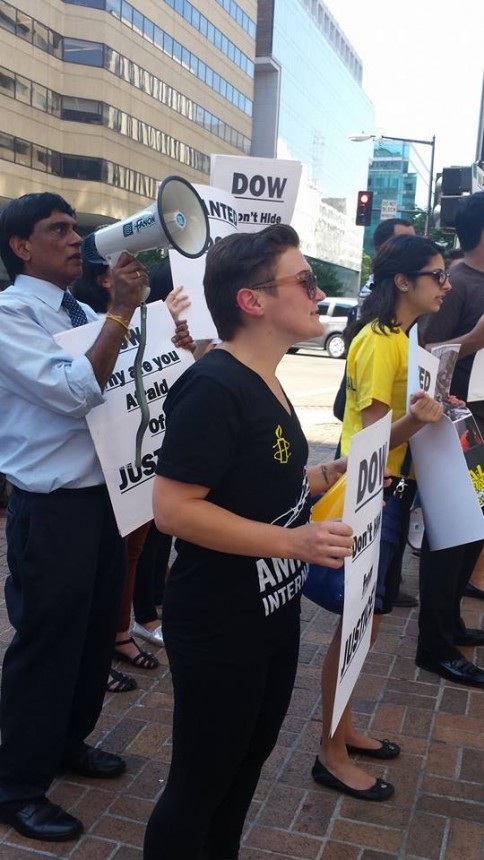 Rally at #DowChemical in Washington. #amnestyinternational demanding Dow attend #Bhopal criminal court July 4th.
Rally at #DowChemical in Washington. #amnestyinternational demanding Dow attend #Bhopal criminal court July 4th.
Dow Chemical was served a summons in March but Dow complained that it was ‘not properly served’. The mistake was corrected and the summons was re-served.
Dow’s wholly owned subsidiary Union Carbide Corporation (UCC) is a ‘proclaimed absconder’ from Indian justice. It is wanted on CRIMINAL charges of ‘culpable homicide not amounting to murder’. Dow has total control of UCC but has not produced UCC in court.
Dow responded to Amnesty US by saying that “UCC is, and remains today, a separate corporate entity responsible for its own debts and obligations” seeming to suggest that Dow has no intention of attending court.
Dow states that it is an entirely separate corporate entity to Union Carbide but that is not, of itself, a sufficient statement of law to divorce Dow from UCC’s legal liabilities. It is not possible to say, given that information, that “there is no justification for a claim being brought against Dow”.
A parent company may be held liable for the debts of its subsidiary in circumstances which vary between legal systems. But Dow has the legal power to control, and therefore the legal responsibility for, UCC’s current behaviour with regards to Bhopal.
This is because:
• UCC is a wholly owned subsidiary of Dow. UCC’s board of directors is appointed by Dow and Dow can, through its shareholding, exercise actual control over UCC. If Dow wishes UCC to take, or refrain from taking, any steps with regard to its business, Dow can in practice require UCC to take those steps.
• Dow’s relationship with UCC is much closer than a simple parent/subsidiary relationship: Dow manages all major aspects of UCC’s business: legal, accountancy, treasury, procurement, human resources, environmental, health and safety, management, etc. For all material purposes Dow runs UCC. This means that not only is Dow able to control UCC indirectly through its share ownership as a parent, it is able to control UCC directly because it manages all its business, including crucially its legal affairs. As a consequence, Dow cannot say that it is not responsible for UCC’s current behaviour when that behaviour is controlled, directly and indirectly, by Dow itself.
• Dow’s and UCC’s operations are so intertwined that it is difficult to separate the two. UCC’s submissions to the US Securities and Exchange Commission present its business as a “component” of Dow’s business. UCC’s business is fully integrated with Dow’s. In addition, UCC sells substantially all its products to Dow (and Dow sells UCC’s products under Dow’s name). This means that a distinction between the two companies exists only in terms of formal “corporate personality”. In commercial and reporting terms the two companies are one.
• UCC’s behaviour actually benefits Dow in so far as not paying a debt enhances a subsidiary’s ability to pay dividends to its parent. Importantly, Dow has almost certainly procured that conduct (denying Bhopal liabilities) since it is responsible for legal and accountancy services for UCC. UCC has paid dividends to Dow since completion of the acquisition in 2001. From 2009-2011 these dividends amounted to $2200m. Dow has made the choice not to require these funds to be used to compensate Bhopal survivors or decontaminate the affected area.
• Dow is wholly responsible for the current conduct of UCC, and for how UCC chooses to deal with the “issues outstanding in Bhopal, particularly in relation to the remediation of the site”. It follows that Dow is necessarily responsible for UCC’s refusal to give further compensation to the victims of the Bhopal disaster, and its refusal to pay for the environmental clean-up of the Bhopal site. To state that “these outstanding issues are not the responsibility of the Dow Chemical Company” is therefore incorrect.
• Dow distances itself from UCC implying that it does not have a relationship with UCC but Dow provides UCC products. Dealing with Dow is no guarantee that products supplied are not UCC products. Given the total convergence of Dow’s and UCC’s business, stockholders and management, there is no substantive difference between dealing with UCC and dealing with Dow. For all material purposes, including those relating to ethics and corporate responsibility, any suggested dichotomy between Dow and UCC is a false one.
• If UCC refuses to compensate victims of the Bhopal disaster, pay for the environmental clean-up, or submit to the jurisdiction of the Indian Court in criminal proceedings, those are all decisions for which Dow has direct management control and therefore responsibility (further to point 2 above).
• Dow is no less responsible for UCC’s conduct with regards to Bhopal than any other supplier would be with regards to a fully owned subsidiary found to be abusing human rights. For example, if UCC was found to be employing slave labour, then Dow, the supplier, as parent would rightly be held “responsible” for the acts of its subsidiary.


